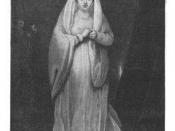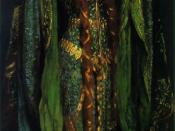MACBETH- A STUDY OF EVIL Throughout Macbeth the audience/reader is confronted with many disturbing acts/deeds, that can be described as evil. Macbeth is often said to be the study of evil, as it shows the consequences following the presence of evil in human life, explores the definition and suggests many ideas about power, the supernatural, insanity and their relationship with the force known as evil. Macbeth studies the bloody rise to power and the fall and death of a man along with his loving and much loved wife, brought upon by three evil witches and Macbeth's and his wife's own nature. Macbeth is considered by many scholars to be Shakespeare's darkest work and also differs from his other tragedies with the addition of a supernatural dimension that purposively conspires against Macbeth.
From the very beginning of the play the audience is introduced to the supernatural source of the following tragic events "the weird sisters"(The witches who are the mouthpieces of the devil).
The trio announces their evil nature and intentions, thus setting the scene for the corruption and murder in the selfish and relentless pursuit for power. Elizabethan witches, their prescriptive powers subtly curtailed; they predict, abet and symbolise damnation but do not, however, determine it. Any sense that Macbeth is a helpless victim, his crime predestined, his will bound is incorrect. The supernatural is used many more times throughout the play as an explanation to the cause of evil and the ability to do evil things. While Macbeth responds to the prophecies of the play's famous trio of witches, Lady Macbeth goes even further by figuratively transforming herself into an unnatural, desexualised evil spirit, saying: "Come you spirits that tend on mortal thought, unsex me hereâ¦. Come to my woman's breasts, And take my milk for gall, you murdering ministers!". Throughout Macbeth Shakespeare shows how greatly supernatural forces can effect characters by robbing them of their humanity. Once the evil is unleashed, through the communication between Macbeth and Lady Macbeth and evil spirits and the murder of Duncan, there is no turning back and so the gruesome and shocking story unfolds, in which there are many brutal, bloodthirsty examples of what evil is.
When the audience first hears of Macbeth, he has just cut an enemy open ("unseamed") from belly button ("nave") to the throat ("chops"). This shows us he is no stranger to killing and gives a first impression/ insight into the brutal man that he is. Despite the praise given by King Duncan, this reinforces an alternative opinion that Macbeth did not begin as a good and fine man, possessing the tragic flaw of ambition, upsetting the divinely-ordained natural order, and so forth, as so commonly believed and taught. Rather, seen as a classic tale of one of the many criminals in society in which their power is gained and maintained by killing those who are of threat to them. It is a difficult concept to accept that a supposedly morally good and brave man, when offered the opportunity of a high position of power, will kill an innocent, sleeping guest in his house (who also happened to be their benefactor of another position of importance). Further more, his best friend, a woman and all her sons (in a helpless state), not to mention many more, less significant murders were all perpetrated. No situation or excuse can account for these evil deeds. The Macbeths do not suffer primarily from conscience; they do not suffer from fear of the afterlife (Macbeth talks about giving up his "eternal jewel" i.e., his soul, to the devil simply as an accomplished fact.). Their fear of human retribution merely drives them to additional murders.
Shakespeare has included many references to, disgusting examples and descriptions of events and objects associated with evil (not to mention the numerous murders listed previously). Following are some illustrations of the fiendish and foul circumstances demonstrated throughout the story: horses going insane and devouring each other's meat while they are still alive, The ingredients of the witches brew (cut off human lips and a baby's finger. Not just any baby- it was a child delivered by a prostitute in a ditch and which she strangled afterwards). To show Macbeth his future the witches added to the brew "grease that's sweated from the murderers gibbet". In those days the bodies of murderers were left hanging on the gallows (gibbet) until they were skeletonised, which takes weeks. After about ten days in suitable weather, there were enough weak points in the skin that the body fat, which has liquified, can start dripping through. There will be a puddle of oil underneath the body! Lady Macbeth really expresses her cruelty when she says: " I have given suck, and know How tender 'tis to love the babe below that milks me: I would, while it was smiling in my face, Have pluck'd my nipple from his boneless gums And dashed the brains out, had I so sworn as you Have done to this." She talks about choosing the murder of an innocent, defenseless baby, possibly her own, rather than breaking a promise of committing regicide. To many this would be the ultimate display of evil. The consequences resulting from the horrors the Macbeths have become and inflicted, greatly out-weigh the rewards of their power.
Macbeth exposes and teaches the repercussions of evil in human life, and predictably the Macbeths end up miserable in unnatural state of fear, isolation, emptiness, insomnia and madness. Their life as king and queen was not the bliss they expected; their power was really for nothing because they feels so threatened. This is evident to Lady Macbeth when she says: "Nought's had, all's spent, Where our desire is got without content.
'Tis safer to be that which we destroy Than by destruction dwell in doubtfull joy." (Act III, scene 2) Everything they had done to gain the power they desired just led to greater discomfort, as they found the dead were much happier than they. Macbeth echoes her thoughts saying: "Better be with the dead, Whom we, to gain our peace, have sent to peace, Than on the torture of the mind to lie In restless ecstacy." (Act III, scene2) These passages show their realisation that power gained by evil is worthless because of how miserable they have become. Man must be held accountable for his behavior, and Macbeth was. And, he sought something that was never his to begin with. They are separated from reality by the inhuman crimes they have committed and have definitely gone psychotic. Lady Macbeth commits suicide, which was considered by Romans as the dignified thing to do and even today would be recognised as common thing to do, under such circumstances. Macbeth however, remains evil until the end and decides it will be more satisfying to take as many people as possible with him. Some people say this fight to the end is an act of bravery, but it is merely an insane mans attempt to preserve the only thing he has left (his position as king). Once the Macbeths kill Duncan, they are committed to a course of lying and killing. Macbeth's sense of right and wrong is eaten away. Even before Macbeth is killed, he is dying of a diseased spirit. With the severance of Macbeth's head, his final speeches and the analysis of the story, the view that evil deeds will be punished severely and leads to nothing but misery is reinforced to the audience.
Macbeth studies many aspects of evil and its occurrence in human life. Macbeth chooses the crown over his honor and material gain in this world over salvation in the next world. Once he has killed to get the crown, the other crimes seem inevitable. In order to keep what he has taken, Macbeth learns to lie and kill as a matter of course. His values become totally confused. "Fair is foul, and foul is fair" to him now; he has lost track of the difference. Macbeth is a prime example to what evil does to humans and can be compared to such real life characters as Adolph Hitler, in that they undergo similar stages/circumstances in the pursuit for power by evil means and are finally destroyed and remembered with hatred.





